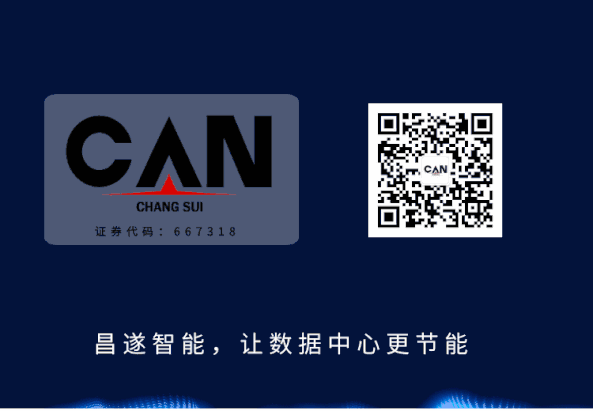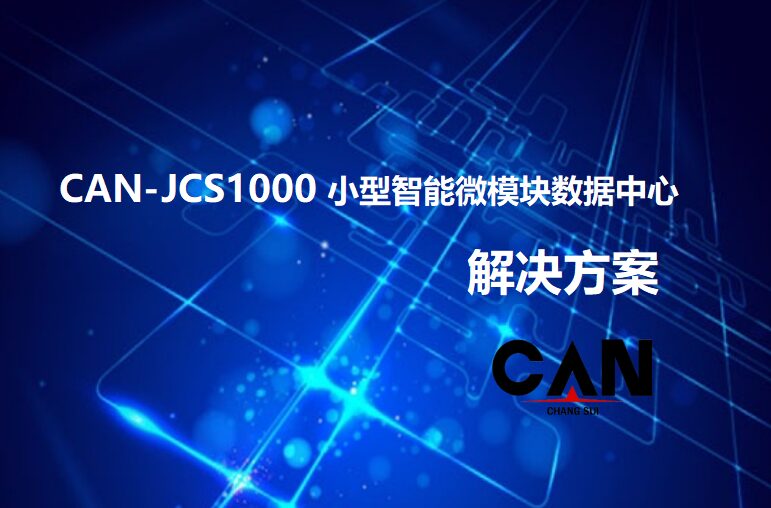
1. Overview
01
Product Positioning
The Changshui CAN-JCS1000 small smart micro module data center is a solution designed for small data centers, typically occupying around 10㎡. This product series is mainly applied in data centers for finance, government, education, healthcare, telecommunications, and small to medium-sized enterprises. Its main features include simple design, quick deployment, strong adaptability, and pre-installed equipment. It is a micro module that can be used by non-professionals!

02
Product Features
2. Overall Solution Provision
01
Overall Design Overview
The initial design plan of the system determines the reliability of the system’s operation later. Therefore, we always focus on the fundamental concept of using high-reliability operation. For the usage environment of the CAN-JCS1000 series, we choose to adopt a dual-bus architecture to ensure high reliability for critical dual-power servers or critical dual-power loads. For single-power devices with critical loads, we recommend using ATS/STS (dual-route converters) to ensure reliable operation of single-power critical loads.
02
Overall Design Working Principle
1. N Architecture (Single UPS) UPS Power Working Principle
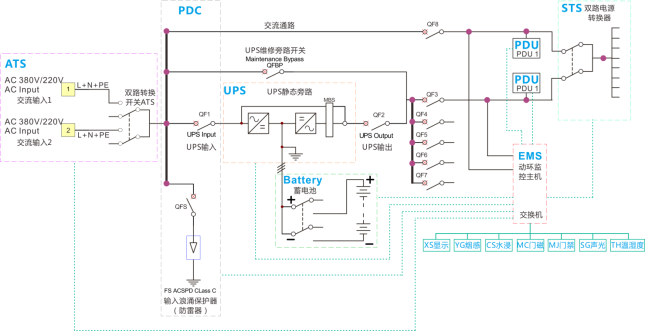
Advantages:
1) Dual-bus architecture, providing high reliability for critical dual-power servers or critical dual-power loads;
2) The ATS automatic dual-power converter at the input can automatically switch between dual routes;
3) Lower financial investment for a single UPS power supply, allowing for more reserved U positions for servers;
4) UPS output and mains output can choose ATS or STS (optional) to protect single-power devices with critical loads;
5) The monitoring level of the power distribution module can be divided into basic, standard, and high configuration types, allowing users to choose according to their needs.
Disadvantages:
The composed dual bus consists of UPS output and mains output, with no UPS protection for mains power output, posing certain risks.
2. 2N Architecture (Dual UPS) UPS Power Working Principle
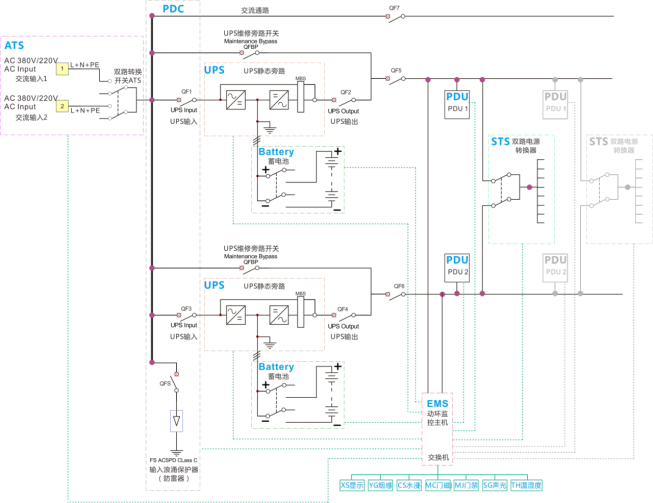
Advantages:
1) Dual-bus architecture, providing high reliability for critical dual-power servers or critical dual-power loads;
2) The ATS automatic dual-power converter at the input can automatically switch between dual routes;
3) Dual UPS power supplies form a dual-bus architecture, each with UPS protection, making it safer and more reliable;
4) UPS output and mains output can choose ATS or STS (optional) to protect single-power devices with critical loads;
5) The monitoring level of the power distribution module can be divided into basic, standard, and high configuration types, allowing users to choose according to their needs.
Disadvantages:
1) The composed dual bus consists entirely of UPS outputs, resulting in high reliability but higher financial investment;
2) Reduced reserved U positions for servers.
3. N+1 Architecture (Dual UPS Redundant Parallel) UPS Power Working Principle
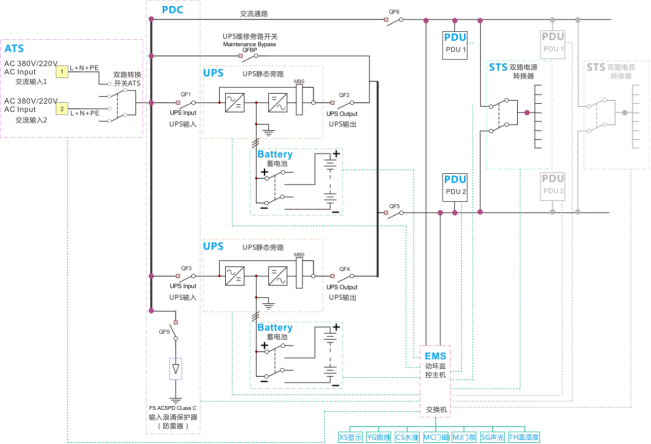
Advantages:
1) Dual-bus architecture, providing high reliability for critical dual-power servers or critical dual-power loads;
2) The ATS automatic dual-power converter at the input can automatically switch between dual routes;
3) Dual UPS power supplies form an N+1 redundant parallel architecture, enhancing redundancy of UPS output, allowing for both redundancy and expansion;
4) UPS output and mains output can choose ATS or STS (optional) to protect single-power devices with critical loads;
5) The monitoring level of the power distribution module can be divided into basic, standard, and high configuration types, allowing users to choose according to their needs.
Disadvantages:
1) The composed dual bus consists entirely of UPS outputs, resulting in high reliability but higher financial investment;
2) Reduced reserved U positions for servers.
3) The composed dual bus consists of UPS output and mains output, with no UPS protection for mains power output, posing certain risks.
03
System Linking
1. RS485 Linking
Currently, most micro module devices use RS485 for linking, but RS485 has the following drawbacks:
◆ RS485 bus has poor fault tolerance, a single layout structure, high wiring requirements, and is difficult to expand.
◆ RS485 bus only defines the physical layer, does not define the data link layer, lacks a bus error detection mechanism, and cannot lock; if one fails, all fail,
and cannot all succeed; poor confidentiality and difficult maintenance.
◆ RS485 bus has poor anti-lightning and static electricity capabilities, usually used in non-isolated forms. The on-site environmental requirements are high, making it easy to damage.
◆ Protocols cannot form industry standards, mostly enterprise standards, customized, and difficult to integrate.
◆ Communication efficiency is low; the industry generally adopts a half-duplex inquiry mechanism; the more bus devices, the longer the polling time, making it impossible to respond promptly to alarms or other
abnormal events.
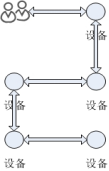
RS485 Linking Schematic
2. Network as Primary, RS485 as Auxiliary Linking
To address the shortcomings of RS485 in linking, we mainly adopt a network method for linking, using RS485 or CANBUS as auxiliary methods to expand devices, with the following advantages:
◆ Main devices adopt network linking, supplemented by RS485 and CANBUS, ensuring communication performance and enhancing JEMS expansion capabilities.
◆ Diverse wiring structures, flexible expansion.
◆ High communication efficiency, multi-threaded concurrency, timely data response. Built-in error detection and retransmission mechanisms, fully isolated, high reliability.
◆ High communication bandwidth, fast data encryption speed, high security.
◆ Standardized protocols, making it easy to expand monitoring devices and maintain.
◆ Convenient wireless expansion.
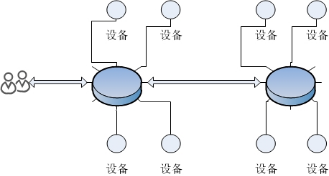
Network Linking Schematic
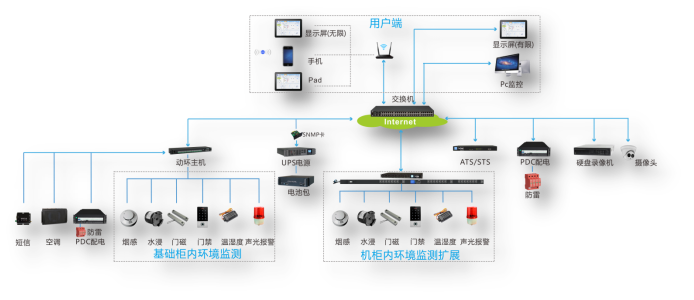
3. Typical Cases and Configurations
The CAN-JCS1000 series micro module standard types are divided into three categories: basic type, standard type, and high configuration type. The differences among categories lie in the degree of intelligence of the equipment within the cabinet; the standard power configuration within the cabinet is: 3KVA, 6KVA, 10KVA single-phase input/single-phase output; the number of cabinets is usually: 1-3 cabinets, including basic cabinet, IT cabinet, network cabinet, and battery cabinet. We accept customized design solutions for non-standard requests from users.
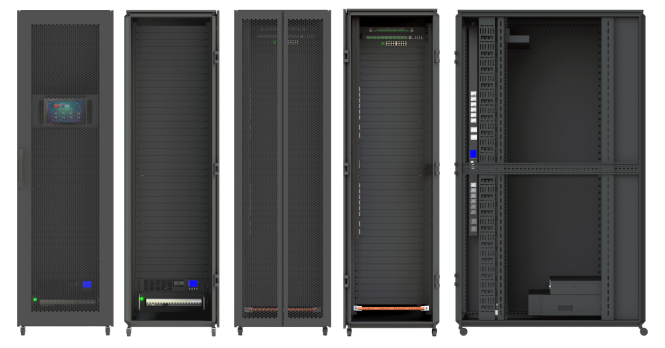
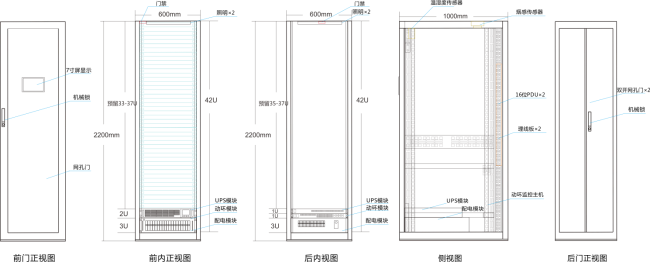
CAN-JCS1000 series single cabinet schematic
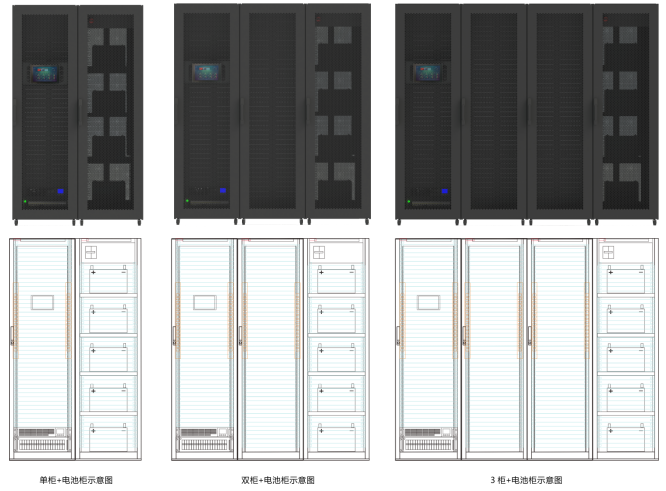 CAN-JCS1000 series single cabinet, dual cabinet, 3 cabinet, battery cabinet schematic
CAN-JCS1000 series single cabinet, dual cabinet, 3 cabinet, battery cabinet schematic
CAN-JCS1000 series micro module classification description
2. CAN- JCS1000 Standard Type:
The standard type power distribution is an intelligent configuration, all with monitoring functions, such as: intelligent power distribution with overall monitoring, UPS power supply with local and remote monitoring, high intelligence level, cost-effective.
3. CAN-JCS1000 High Configuration Type:
The high configuration type power distribution system is all intelligent configuration, all with monitoring functions, such as: intelligent power distribution monitoring 8-channel switching status, UPS power supply with local and remote monitoring, intelligent PDU for monitoring temperature and humidity, smoke detection, and door magnetic detection, with a very high degree of intelligence, suitable for customers with high management requirements for precision equipment.
4. System Structure Composition and Parameters
CAN-JCS1000 consists of cabinets, power distribution systems, and monitoring systems. We will introduce the composed equipment.
01
Cabinets
1. Cabinet Classification:
Cabinets are usually divided into four categories: intelligent basic power distribution cabinet, IT cabinet, network cabinet, battery cabinet.
Cabinets comply with IEC60297-1 standards, providing reliable and stable installation space for data center servers, ensuring the safe operation of servers.
2. Cabinet Features:
Basic cabinet + IT cabinet + network cabinet + battery cabinet, all using front and rear airflow duct mesh cabinets. For basic cabinets, IT cabinets, and network devices with low load-bearing requirements, assembled skeleton cabinets can be used; for battery cabinets with high load-bearing requirements, profile cabinets are preferred.
Cabinets meet the following characteristics:
◆ Cabinet mesh door ventilation rate not less than 70%;
◆ 19-inch standard installation structure, dimensions: 600×2000×1000mm;
◆ Quick-open side doors;
◆ Vertical wiring management board, horizontal wiring rack, L-shaped bracket, U-shaped bracket, 1U quick-install blanking panel;
◆ Two vertical PDU (forming a dual-bus architecture) can be installed at the back of the cabinet with PDU brackets;
◆ Each “U” position is marked on the vertical installation of the cabinet;
◆ The front and rear doors of the cabinet are locked and can be opened with a special key;
◆ The cabinet supports base installation (user to prepare base);
◆ Heavy-duty casters and support feet;
◆ Ground rail.
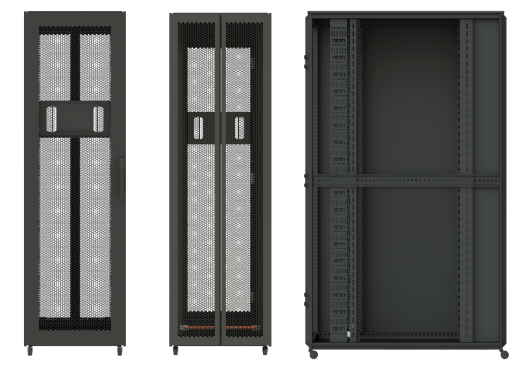
3. Cabinet Parameters:
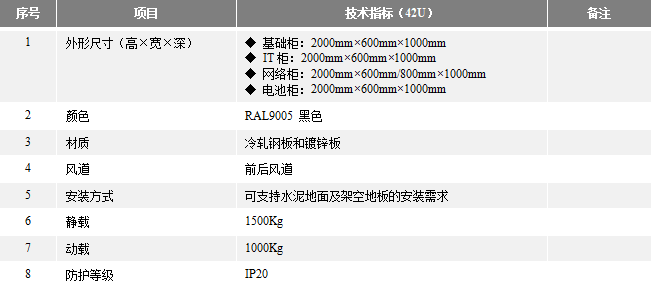
02
Power Distribution System
1. Phase:
Single-phase 220V power supply system
2. JPDC Power Distribution Module Classification:
1) Divided into three specifications based on total input current: 80A, 63A, 32A
 Power Distribution Module Switch Parameters
Power Distribution Module Switch Parameters
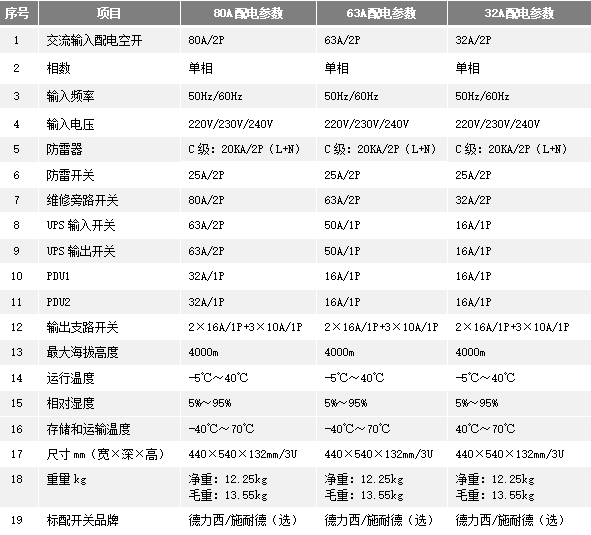
2) Divided into three specifications based on UPS power supply configuration architecture: N (single UPS), 2N (dual UPS), N+1 (dual UPS redundant parallel)
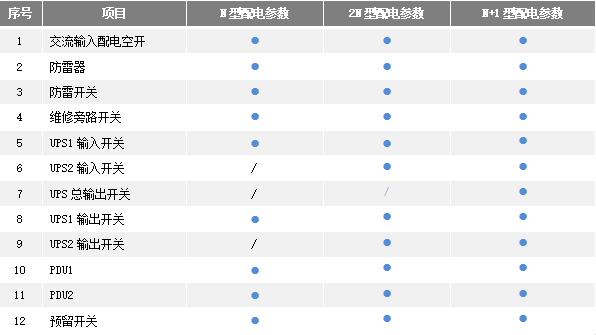
3) Divided into three specifications based on intelligent monitoring degree: non-intelligent type, intelligent monitoring total input type, intelligent monitoring high configuration total input and each branch type
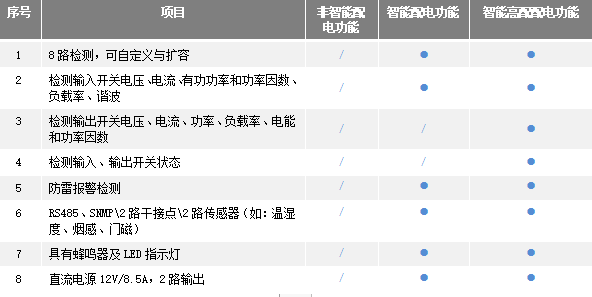
03
Power Supply System
1. UPS Power Supply

Specific Parameter Table
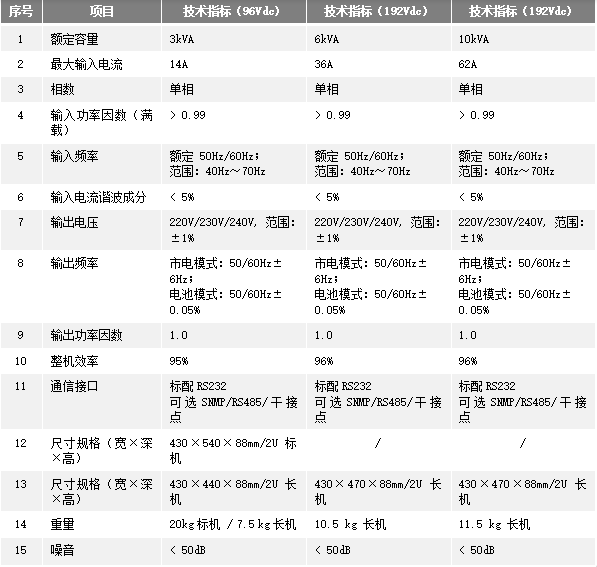
2. Lead-acid Battery Pack

Specific Parameter Table
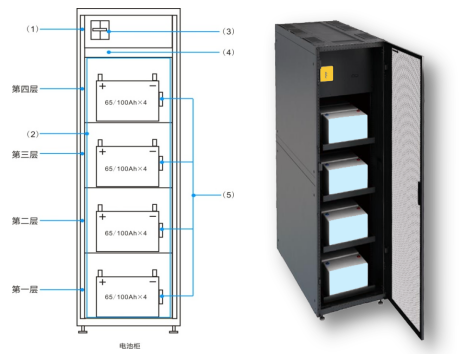
3. Lead-acid Battery Cabinet
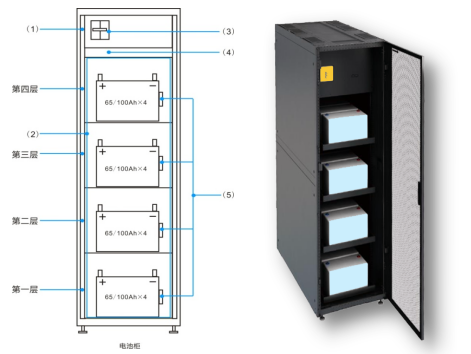
(1) Battery Cabinet(2) Battery(3) Circuit Breaker (4) Battery Monitoring and Management(5) Battery Temperature Sensor
Specific Parameter Table

Note: When configuring large-capacity batteries, battery packs are not configured. Specific plans can be formulated according to customer requirements. The battery cabinet includes battery DC switches.
4. Lithium Iron Phosphate Battery

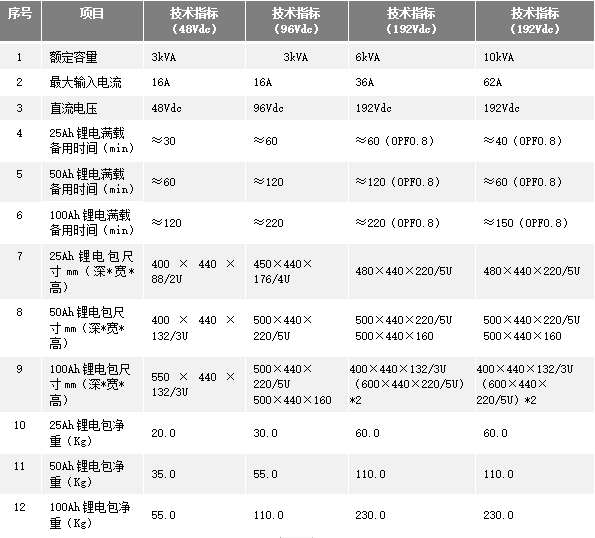
04
PDU
1. PDU Installation Methods:
Horizontal and vertical installation
2. PDU Classification:
Intelligent and non-intelligent types
3. Intelligent PDU Classification:
Intelligent PDUs are divided into three categories based on functionality: basic overall monitoring type, overall monitoring + branch monitoring type, overall monitoring + branch monitoring + branch control type
4. Input/Output Phase Classification:
Single-phase and three-phase
5. Input Current Classification:
16A and 32A
6. Output Port Classification:
8 ports, 16 ports, 24 ports; the market also has 20 ports, 12 ports, 30 ports, etc.
7. Output Socket Specification Classification:
International standards C13, C19; national standards 5-hole, 3-hole, universal specifications; anti-pull functions, etc.
The following images show a 24-port vertical intelligent type 16A/32A: C13×21 ports + C19×4 ports


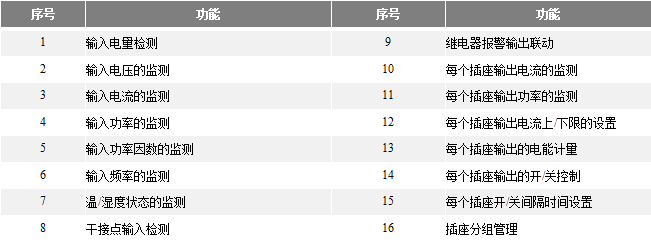
The following image shows a 16-port vertical intelligent type 16A/32A: C13×12 ports + C19×4 ports

The following image shows a 20-port vertical intelligent type 16A/32A: C13×16 ports + C19×4 ports

The following image shows an 8-port horizontal intelligent type 16A: C13×8 ports

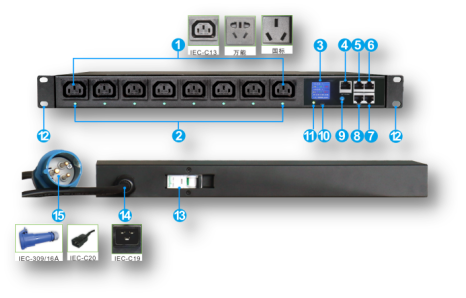
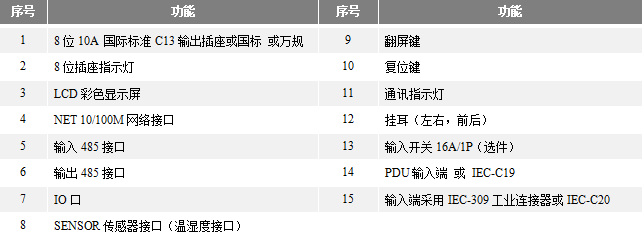
8. Intelligent PDU Classification Table:
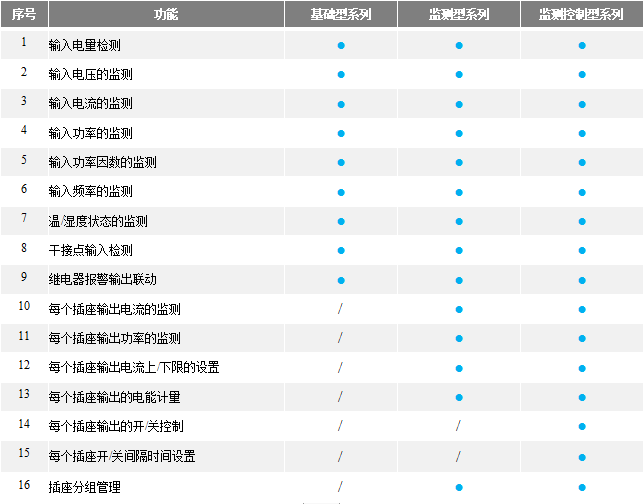
9. Intelligent PDU Monitoring Topology
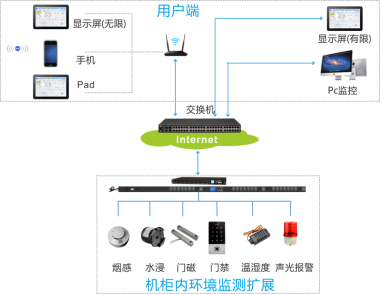
10. Basic Parameter Table
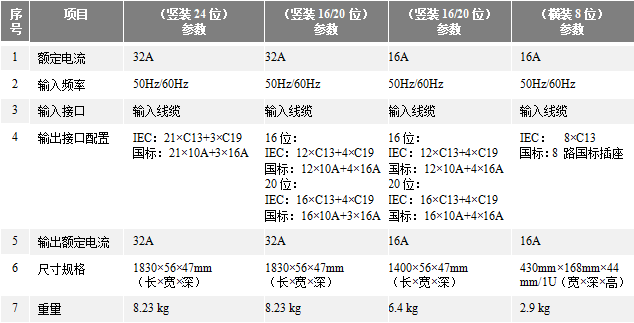
05
Monitoring Management System
JEMS is mainly used for monitoring the equipment and environment within intelligent integrated cabinets.
1. JEMS Dynamic Environment Mainframe Structure Introduction
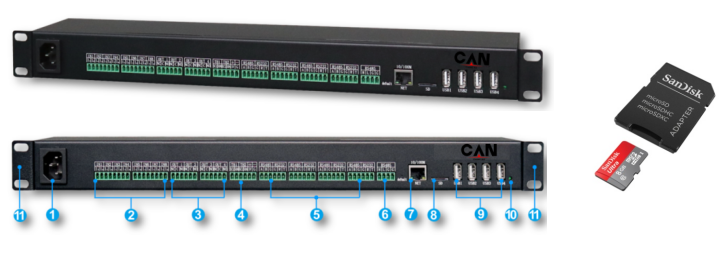 (1) Power Input Plug C14
(1) Power Input Plug C14
(2) IN1-8 Input Level Detection
(3) OUT1-4 Dry Contact Output Signal
(4) TH1/2 Two Digital Temperature and Humidity Sensor Interfaces
(5) 4 RS485/232 Interfaces
(6) CANBUS Interface
(7) Network Interface
(8) SD Memory Card Port (Built-in SanDisk card 8G memory high-speed TF card)
(9) USB Peripheral Power Supply Interface
(10) Working Indicator Light
(11) Hanging Ear (Left and Right)
2. JEMS Dynamic Environment Mainframe Parameter Introduction
JEMS Technical Parameters:
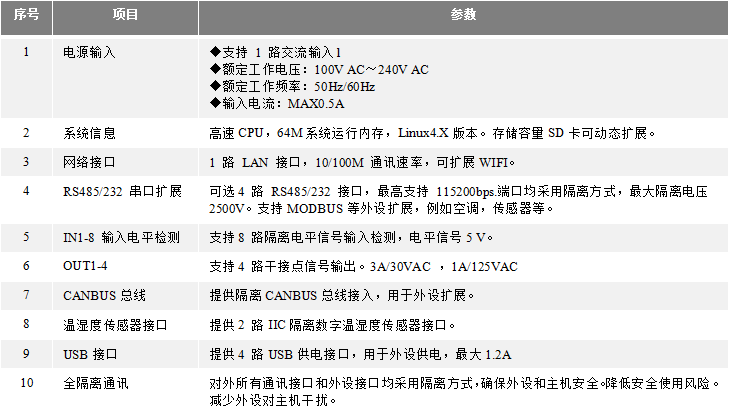
JEMS Main Control Main Service Description:

IP Other Function Description:

Physical Parameters:

3. Dynamic Environment Monitoring Topology Diagram
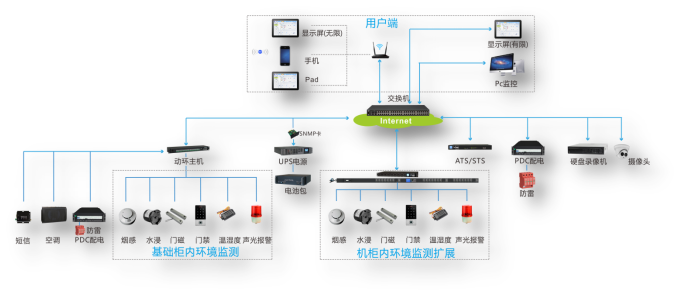
4. JEMS Dynamic Environment Mainframe Software and Monitoring Interface

06
Detection Sensors
1. Smoke Detection Sensor
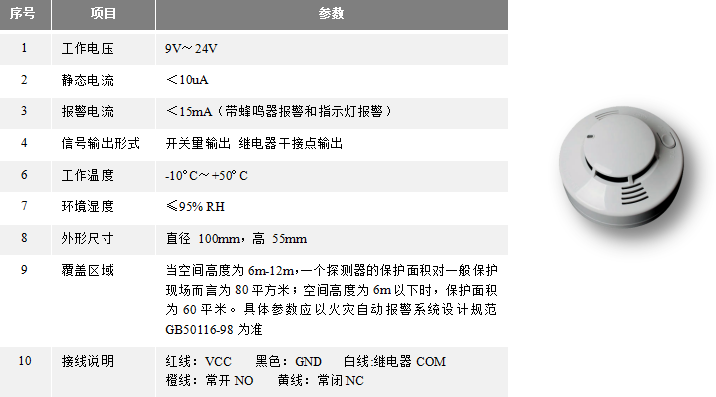
2. Temperature and Humidity Sensor

3. Door Magnetic Sensor
The door magnetic switch mainly consists of a switch and a magnet. When the two are separated or brought close to a certain distance, it triggers the opening and closing of the switch, thereby sensing changes in the position of objects.

4. Access Control
The access control system restricts permissions on the intelligent “door”, serving as a security measure for the “door”.
The intelligent access control adopted by CAN-JCS1000 includes metal waterproof, fingerprint, password, and card access control, waterproof, sun-proof, and dust-proof.
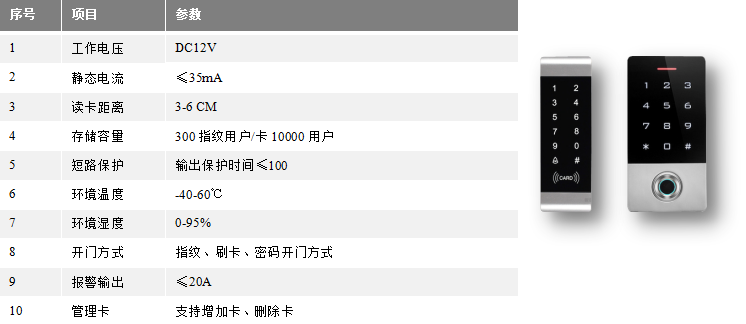
07
Optional Items
1. Battery Detection System
1) Introduction to the Battery Detection System
JBS-9600 is a new generation battery performance online monitoring system, adopting an advanced one-to-one distributed structure (as shown below, a single battery installs a single monitoring module, which is aggregated to a coordination module), capable of completely replacing manual maintenance modes, online monitoring all operational parameters and performance parameters of batteries, comprehensively understanding the performance status of batteries, timely identifying underperforming individual batteries, eliminating safety hazards, and ensuring uninterrupted system operation. Meanwhile, through monitoring the trend changes of performance parameters such as internal resistance and pole temperature, it can provide real-time warnings for batteries showing performance declines and offer maintenance suggestions, allowing users to take appropriate measures in advance to extend battery life.
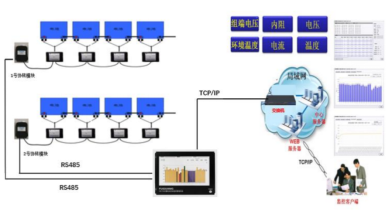
2) Main Functions of the Product
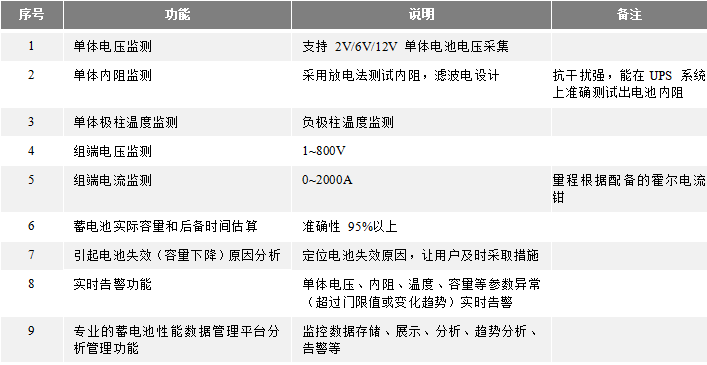
3) Configuration and List
Based on the number of battery packs on-site, combined with the characteristics of the JBS-9600 system product, the configuration principles and list are as follows:
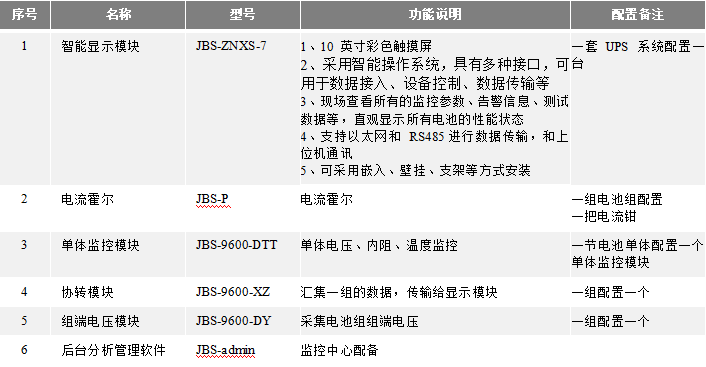
2 ATS/STS Dual Power Converter
1) Overview of ATS/STS Dual Power Converter
ATS is an automatic transfer switch, while STS is an automatic static transfer switch; the difference lies in the duration of the transfer time, with ATS transfer time typically being 10-12ms and STS transfer time usually being 2-4ms. Both ATS and STS products can provide high-reliability redundant power for single-power devices. Rack-mounted ATS and STS are equipped with dual input power lines to supply power to connected devices. When the main power supply experiences abnormalities, the backup power will immediately supply power to the rack ATS without interrupting the power supply to critical loads. Networked devices have built-in network connection functions, allowing for remote management through Web, SNMP, or Telnet interfaces.
2) Main Features of the System
◆ Uses microcontroller-based full digital control, ensuring higher system consistency and stability;
◆ Highly reliable dual power supply completely isolated design greatly enhances equipment safety;
◆ Automatically identifies the amplitude and polarity of input voltage, with automatic abnormal alarm;
◆ Equipped with multiple built-in connection functions, allowing for remote management via 485, Web, SNMP, or Telnet interfaces; multiple sensors can monitor the cabinet working environment in real-time;
◆ Supports TLS encryption authentication, provides SNMP v3 Agent, supports DES or AES authentication methods. Provides an MD5 or SHA private
◆ matrix display 1.3-inch color LCD screen, displaying device input and output currents, operational status, historical records, user-friendly interface for customer use.
3) Architecture Introduction
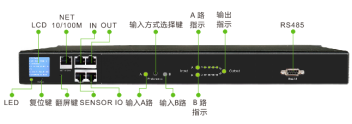
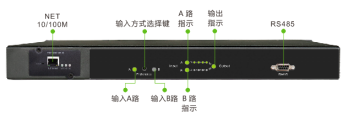
4) Remote Monitoring Topology
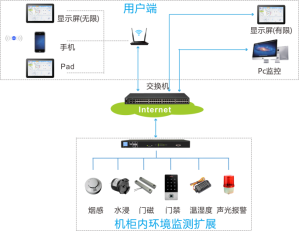
5) 16A Technical Parameters
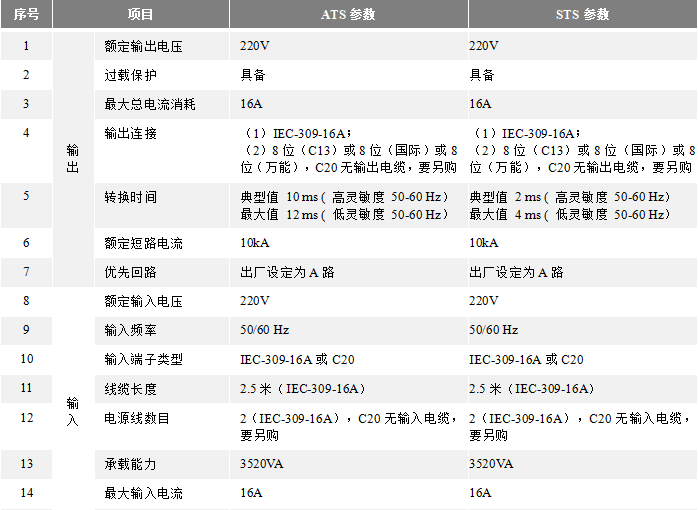

6) 32A Technical Parameters
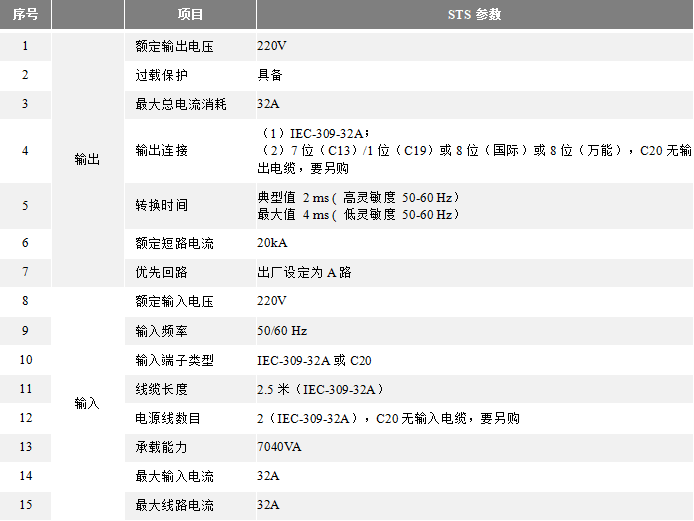

3. WiFi Router
Provides WiFi signal for data interaction with the host computer or display panel LCD/Pad.
JD-LINK mini wireless router 300M, USB powered. Wired to WiFi wireless signal relay amplifier router TL-WR802N.
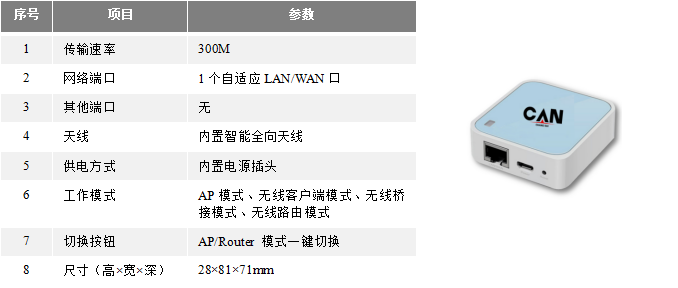
4. Video Surveillance System
The video system hardware consists of cameras and network video recorders, realizing real-time monitoring, video storage, and playback management functions.
A 2 million pixel hemispherical camera with network interface, wide dynamic infrared zoom network camera, supports wall-mounted or hanging installation methods.
5. Lightning Protection and Grounding System
Primarily used in building machine rooms, the entire power distribution system is just a subsystem within the building’s power distribution system; the lightning protection device SPD of the power supply system is provided by the building’s low-voltage main distribution room/cabinet.
Standard configuration C-level lightning protector, with lightning protection switch at the front.
◆ If the power cable of the air conditioning outdoor unit needs to run to the roof, it is recommended to use iron pipes or metal wire troughs for installation; the iron pipes or metal wire troughs should maintain electrical continuity;
◆ SPD connection wires should be as short and direct as possible, not exceeding 0.15m, and the power connection wire of SPD should use a minimum cross-sectional area of 10mm 2 copper wire, while the grounding wire of SPD should use no less than 16mm 2 copper wire.

6. Grounding Scheme
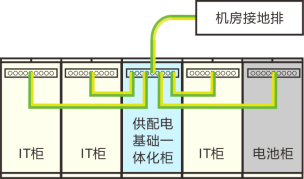
7. Fire Protection System
1) Introduction to the Fire Protection Module
The JCS1000 can adopt a rack-mounted seven-fluoropropane gas fire extinguishing module, which has the following advantages compared to traditional fire extinguishing equipment:
◆ Strong targeting: The protection area is inside the cabinet, protecting important electrical components and data in servers;
◆ Rapid extinguishing: Adopting a no-pipeline design, the extinguishing agent can quickly diffuse throughout the cabinet within 8 seconds;
◆ Strong interchangeability: The fire protection plug-in interface is consistent with other modules, making maintenance and replacement convenient and quick;
◆ Network communication: Each module has a network communication interface, facilitating real-time monitoring of the status of each cabinet.

2) Technical Parameters

8. Integrated Wiring System
1) Integrated Wiring
Supports the installation of wiring troughs at the top of the cabinet to achieve separate management of cables. The wiring troughs are divided into communication lines and power lines, used respectively for signal lines and power lines.
2) Cables
◆ Power Lines
Power lines include input power lines for intelligent basic power distribution cabinets, UPS to battery switch power lines, battery cabinet power lines, PDU power lines, AC power lines, etc.
◆ Grounding Lines
Grounding lines include grounding lines for intelligent basic power distribution cabinets, battery cabinets, IT cabinets, network cabinets.
◆ Monitoring Cables
Monitoring cables include temperature and humidity sensor monitoring cables, intelligent basic power distribution cabinet monitoring cables, UPS monitoring cables, smoke detector monitoring cables, video monitoring cables, and door magnetic alarm cables, etc.
9. CAN-JCS1000 Technical Indicators
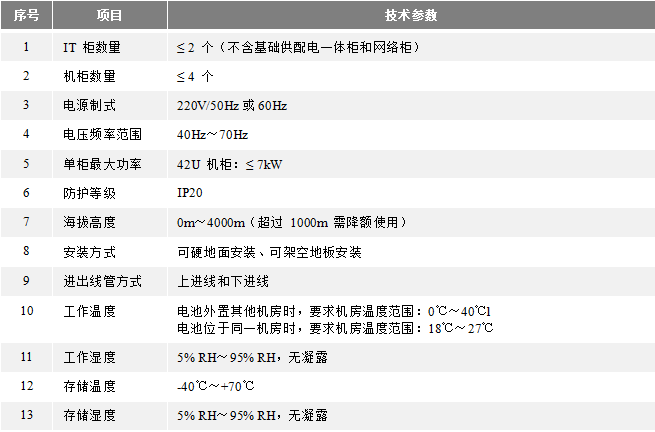
10. Equipment Derating Coefficient
The derating coefficient of the UPS is as shown in the table below:
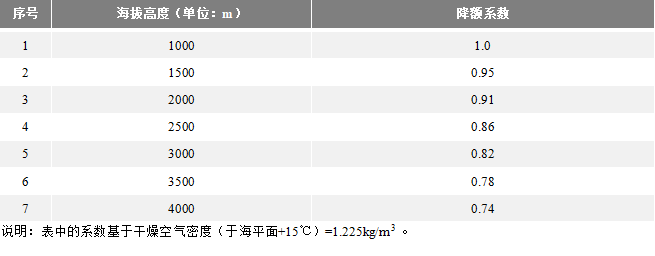
CAN
Changshui (stock code: 667318) is a national high-tech enterprise. Our products are mainly used in IDC data centers, solving end power distribution, while also providing power solutions and having production capabilities. Adhering to the service concept of “making rack distribution more flexible and making data centers more energy-efficient,” we are committed to building the infrastructure for big data industrial parks IDC/EDC, providing customers with comprehensive solutions from data center planning, construction, operation, to IT infrastructure.
Changshui is partnering with the Silk Road (Haikou) Social Science Research Institute, the International Cooperation Center of the National Development and Reform Commission, China Economic Times, experts from the China Power and New Energy Industry Think Tank, BAST Training Operation Center, and many strategic partners to continuously innovate development models, reform technological capabilities, and improve management quality to provide customers with better services.
